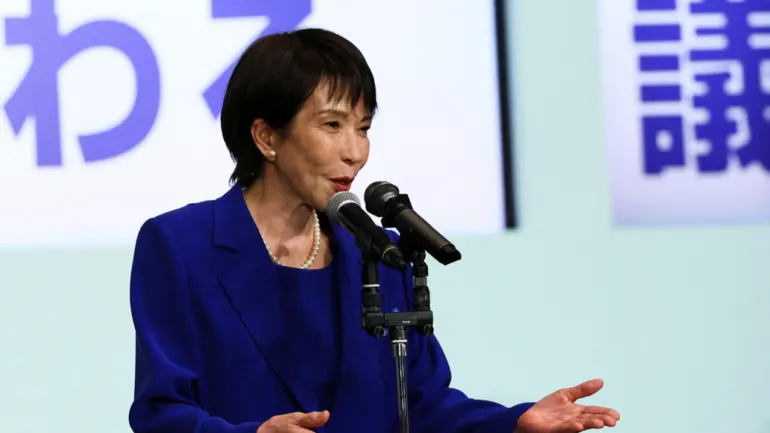Sanae Takaichi won the leadership of Japan’s ruling Liberal Democratic Party (LDP) on Saturday, positioning her to become the country’s first female prime minister.
She defeated Shinjiro Koizumi, the charismatic but inexperienced son of a former premier, in a runoff vote. The 64-year-old conservative, known for her hardline stances on national defense and economic security, outpaced both Koizumi and seasoned contender Yoshimasa Hayashi.
Once formally confirmed by parliament, a near certainty, Takaichi will become Japan’s fifth prime minister in as many years, amid growing voter discontent over inflation and a recent slush fund scandal. Meanwhile, the anti-immigration Sanseito party has gained momentum.
Takaichi has taken a tough stance on immigration and foreign tourism, key issues in the leadership race, as she seeks to reclaim lost support for the LDP. A former economic security minister, she is a vocal critic of China’s military expansion in the Asia-Pacific and a regular visitor to the controversial Yasukuni Shrine, which honors war dead including convicted war criminals and is seen by neighboring countries as a symbol of Japan’s militarist past.
During the recent leadership race, however, she softened her rhetoric compared to her previous campaign, where her pledge to visit Yasukuni as prime minister contributed to her loss to outgoing premier Shigeru Ishiba.
‘Iron lady 2.0’ with conservative views on gender
Once a college heavy metal drummer, Takaichi admires former British Prime Minister Margaret Thatcher and is seen as an “Iron Lady 2.0.” While her election would mark progress for women in Japanese politics, experts note she has shown little interest in challenging patriarchal norms.
She opposes revising Japan’s 19th-century law requiring married couples to share the same surname — a rule that overwhelmingly forces women to adopt their husband’s name — meaning gender equality issues are unlikely to advance during her tenure.
Nevertheless, she pledged to improve gender balance in her cabinet to “Nordic” levels. Japan ranked 118th out of 148 countries in the World Economic Forum’s 2025 Gender Gap Report, largely due to women’s underrepresentation in government, while Nordic countries like Iceland, Finland, and Norway top the list.
Takaichi enjoys strong support from the LDP’s conservative wing and followers of the late former prime minister Shinzo Abe. She supports aggressive monetary easing and expansive fiscal spending, echoing “Abenomics,” policies that could impact markets if reintroduced.
She has also expressed concerns over crime and the economic influence of foreigners in Japan, advocating stricter regulations — an effort to win back voters drawn to nationalist parties with anti-immigration platforms.
On trade, she stated recently that she would not hesitate to renegotiate U.S. agreements if they prove unfair to Japan.
AFP


